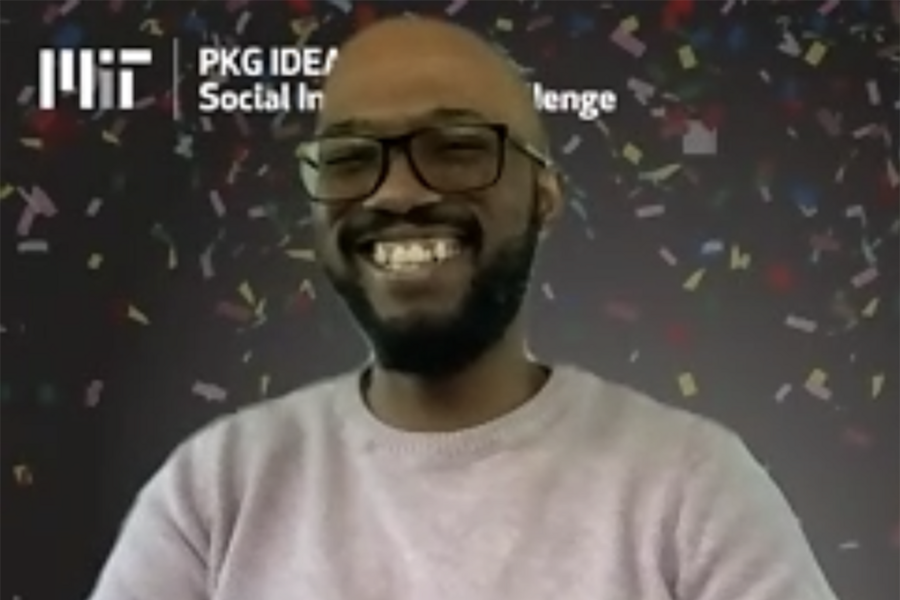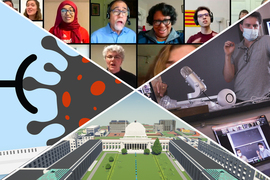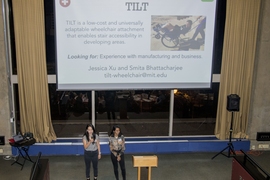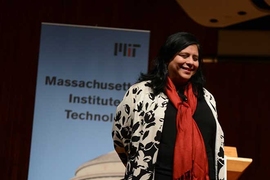Currently, less than 7 percent of high school graduates in the African nation of Eswatini proceed to higher education, according to a 2020 UNICEF study. This troubling fact led Thandolwethu Dlamini, a graduate student in MIT’s Technology and Policy Program, to found The Knowledge Institute (TKI), which earned a $20,000 grant at the 20th annual MIT IDEAS Social Innovation Awards on April 25. TKI is developing a mobile platform to simplify and streamline the college application process for high schoolers in Eswatini, Dlamini’s home country. Nearly 60 percent of Eswatini’s population lives below the poverty line and additional education could substantially improve the lives of many of the country’s young people. “This is an investment in the youth and in the future of Eswatini” said Dlamani upon receiving the award. “We are extremely grateful for IDEAS for believing in our project and helping us throughout the entire IDEAS program as we were refining everything.”
IDEAS has been influencing the social innovation ecosystem at MIT for two decades and, like many of the teams that engage in the year-long program, has evolved significantly during that period. The most notable shift, led by Rebecca Obounou, PKG Center’s assistant dean for social innovation, has been transitioning the tone of IDEAS from a “competition” to a more collaborative “challenge.”
“The challenges that society faces today require collaborative frameworks over competitive ones,” Obounou says. “We de-emphasize competition to invite more people in. We de-emphasize 'winning' because it implies that there are losers. It's a win for the PKG center when we have the opportunity to support any student along their social change pathway. As a result, we see many MIT students and their teammates who would not have otherwise typically identified as a social innovator or entrepreneur finally see their ability to make positive change! Our world's challenges cannot be solved alone by the subjective 'best' but rather the input of as many stakeholders as possible is imperative. I learned this concept early on as a young girl who grew up in the Haitian community, where the konbit philosophy was one in which many people survived and thrived. One key tenet of the konbit culture is community, and a popular saying is that, 'With many hands, burdens are light.'"
However, even early iterations of IDEAS had a monumental impact on participants. Rebeca Hwang ’02, MNG ’03, the first IDEAS grantee in 2001, gave the keynote address at this year’s awards ceremony. “From the perspective of my life and the future career that I had after MIT IDEAS, it was a huge success because it did launch my thinking and my understanding of what it means to run successfully some of these projects that involved much more than technology,” said Hwang. “It has also broadened my empathy and my understanding of these target markets; that I could live with, in their community, and become much more sensitized to some of the education and awareness building and culture factors that make some of these projects successful.”
Fifty percent of all IDEAS grantee projects are still active in some form, and it is common for those with connections to the IDEAS program, like Rebeca Hwang, to stay in touch or remain involved with the program. Other members of the “IDEAS village” come back year after year because the work of the student teams continues to inspire. A group of these volunteers (project reviewers, judges, and mentors) received special recognition this year for their many years of service.
“IDEAS is a team-based program because that reflects the reality of how real social change occurs,” says Jill Bassett, PKG Center associate dean and director. “Our diverse and talented reviewers, judges, and mentors are crucial to the development of our students’ projects. The connections our students build with these individuals often persist long after the challenge cycle has wrapped up.”
Earlier this year, IDEAS launched a limited-series podcast in honor of its 20th anniversary to celebrate the many faces of the program, featuring program alumni and community partners as guests. A group of 20 volunteer judges from around the world with a diverse set of backgrounds and expertise helped determine the allocation of four juried grant awards. Judging groups reviewed teams’ written proposals and participated in a round of virtual interviews the day before the award. The four juried grantee teams were:
- The Knowledge Institute (TKI) (Eswatini) is developing SaSa, a mobile-friendly web platform that will enable high school graduates to quickly and inexpensively apply for tertiary education. SaSa will increase successful application outcomes for low-income students and improve awareness of available higher education options with the ultimate aim of lifting young students out of poverty. ($20,000 grant)
- Kivuli (Kenya) offers a range of services that facilitate connections between Kenya’s "Jua Kali" informal manufacturing sector and the construction industry. Kivuli's business model is designed to support the long-term economic security of Jua Kali workers while pushing the Kenyan building sector toward more sustainable and locally-oriented practices. ($15,000 grant)
- Critical Healthcare Information Integration Network (CHIIN) (Nigeria) is a free SMS messaging system that provides validated medical information on context-relevant diseases to community health workers practicing in rural settings. CHIIN relies on SMS messaging to reach offline community health workers and empower them with insights needed to guide care decisions and ultimately improve patient outcomes. ($10,000 grant)
- Sustainable Sea (United States) is developing a machine-learning-based aquaculture monitoring and response system that uses microbiome data to predict and prevent disease. Seaweed aquaculture has the potential to feed the world, fight climate change, and restore the oceans, but the rapid growth of seaweed production is accelerating the spread of infectious diseases that harm the seaweed and lead to socioeconomic instability due to the loss of the farming income. The Sustainable Sea system will reduce livestock losses, lead to cost savings, and promote sustainable food production. ($7,500 grant)
Additionally, two IDEAS projects — Compass and Abrazar — received $2,500 “crowd favorite” awards by earning 786 and 544 (respectively) of the 3,702 total votes cast online for various IDEAS projects during the month preceding the awards.
- Compass (Uganda): The Covid-19 crisis exposed the gap in access to modern health-tech tools, such as triaging websites or health-monitoring apps; homeless populations in particular generally do not have reliable internet access, although many have mobile phones with SMS capability. To address this problem, Compass aims to deploy a natural language processing-driven, HIPAA-compliant, mobile-based (mHealth) intervention in Uganda that triages Covid-19. The team is also expanding their platform to triage cancers and communicable diseases like HIV, tuberculosis, and malaria.
- Abrazar (Argentina): Abrazar uses machine learning techniques to identify children exposed to violence, and in this way enables local governments to reach unprotected children. Its initial models suggest that around 70 percent of at-risk children could be identified, representing a 35-times improvement over the current level of detection.
All nineteen finalist teams received $1,000 for their commendable efforts in six different sectors across 17 different countries. Additionally, the finalists took part in a Tackling Social Change seminar series that featured presenters such as MIT Senior Lecturer and Director Jason Jay at the MIT Sloan Sustainability Initiative; the $100 million MacArthur Fellow, Community Solutions; Ingo Michelfelder, postdoc at Harvard Kennedy School Social Innovation + Change Initiative; MIT PhD candidate at History, Anthropology, Science, Technology and Society program and IDEAS graduate community fellow Rustam Khan; Dana François, program officer at the Kellogg Foundation; and Madeleine Avignon from COFHED, a community-development organization in rural Haiti. The seminars engaged the teams with applicable frameworks and intellectual discourse on the sometimes-nebulous field of social innovation. Juried grant recipients and finalists will spend the next year receiving additional mentoring support as they take their projects to the next level, working toward mutually beneficial goals with community partners.
As the awards event concluded, Rebecca Obounou drew upon the words of the PKG Center’s namesake and founder, MIT first lady emeritus Priscilla King Gray, to offer encouragement to all the finalists: “As a partner [to President Paul Gray] Priscilla found three things were necessary: 1) a sense of self, 2) a sense of humor, 3) a love of people.” Obounou shared. “These three items strike me as qualities that many of our social innovators might call on as they walk their paths. Your sense of self to understand your purpose, your values, and your principles, as you’ll have to call on them often as you face a varying world with unanticipated decisions and dynamics. A sense of humor to persevere when things don’t go exactly as you planned and the world is almost certainly going to serve you a lot of curveballs, and you might as well build fun into the process. And a love of people to engage the most proximally impacted and underserved stakeholders with empathy, kindness and a spirit of service.”









